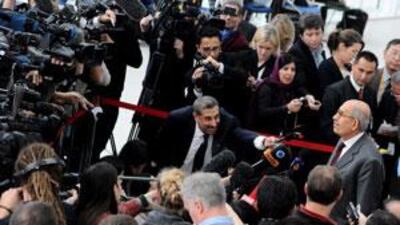CAIRO // After more than three weeks spent observing from afar, Egypt's long-standing but atrophied opposition political parties are beginning to weigh in on Mohammed ElBaradei, a possible presidential contender whose arrival last month injected new energy into this country's political discourse. Both the leftist Tagammu Party and the liberal New Wafd Party welcomed the former head of the International Atomic Energy Agency and Nobel Peace Prize laureate and his stated commitment to dismantling the autocratic system that has dominated Egyptian governance since the country gained its independence in 1952.
But comments from the leaderships of several opposition parties revealed a subtext of resentment with Mr ElBaradei's lack of engagement with the political parties who have long considered themselves to be the vanguards of the Egyptian pro-democracy movement. Many seem to feel spurned by a man they consider to be an arriviste - a political dilettante whose sudden popularity has overshadowed their small but persistent struggles for reform.
"We have been asking for constitutional reform for more than 30 years," said Mahmoud Abaza, the head of the New Wafd Party. "You should have contact with all the political movements in Egypt, you have talks and you agree upon things and you don't agree upon things. And what you agree upon, you can act jointly on it." Of Egypt's official opposition parties - a category that excludes the Muslim Brotherhood, a banned political organisation whose members still hold about one fifth of the seats in Egypt's National Assembly - the New Wafd Party saw the most public debate over their reception of Mr ElBaradei. The party's Supreme Authority stated on Tuesday that they would not enter a dialogue with Mr ElBaradei unless he approached the party first.
The statement followed a high-profile conflict between Mr Abaza, who said his party should not chase after an unwilling Mr ElBaradei, and Mohammed Sirhan, another party leader who wanted a more conciliatory approach with the popular new figure. Meanwhile, the Al Tagammu Party released a statement on Wednesday that welcomed Mr ElBaradei to visit its party headquarters while chastising him for his stalwart independence.
"The point of disagreement between us and ElBaradei is focused on his attitude toward political party life, because everyone who introduces himself to the people as a person who believes in democracy and who struggles to realise it in our country knows well that there is no democracy without plurality and there is no plurality without political parties," the statement read. "Whoever attacks political parties ... also paves the way, whether he means it or not, to a single-minded and one-sided regime."
For many Egyptians and indeed, supporters of Mr ElBaradei, opposition politicians other than those aligned with the Muslim Brotherhood are not to be taken seriously. In the People's Assembly, Egypt's lower house of parliament, the ruling National Democratic Party holds 311 seats. Compare that to the New Wafd Party, which holds six seats, along with two seats for Tagammu and one for the Al Ghad (Tomorrow) Party.
In short, the opposition presence is so insignificant as to be almost negligible, said Issandr al Amrani, a Cairo-based independent political analyst. The number of internet-users who have joined Mr ElBaradei's Facebook group seems to have already exceeded the number of people who voted for opposition parliamentary candidates in the 2005 election, he said. "Really, is this all that important? If the aim of ElBaradei is to create a wider movement and platform for political and social change that people can gather around, they don't really need to attract people who are supporters of the Wafd or Tagammu because those people aren't that many," Mr al Amrani said. "What they need to attract are people who are usually apolitical or who vote and usually support the NDP because of a lack of alternatives."
But if the opposition's distaste for Mr ElBaradei smacks of sour grapes, it may also stem from more practical considerations, Mr al Amrani said. In its current form, the constitution bars Mr ElBaradei from running for president because he has not served as the head of a recognised political party for at least one year. If the opposition were to spend its limited political capital on an unknown entity such as Mr ElBaradei, whose candidacy looks unlikely, they could find themselves even worse off than before.
"They had to make a political calculus. These parties are really largely loyal opposition. Are they going to take the gamble that ElBaradei will miraculously be able to change the constitution and be able to run and then support him, or are they going to settle for deals to extend their presence in parliament for the next elections?" Mr al Amrani said. "It depends on what you think is achievable."
@Email:mbradley@thenational.ae

